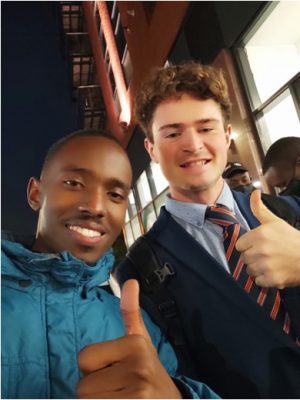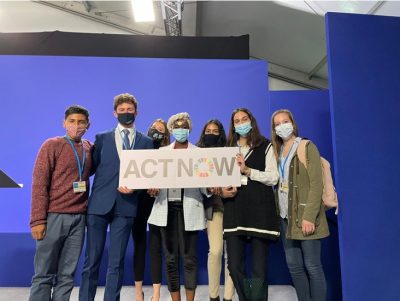By Chase Mack

Thus far, the United Nations Conference of the Parties (COP) in Glasgow this year has been more than I could have fathomed. Never have I mingled with such a diverse array of global citizens, ranging from the Minister of the Environment for Rwanda to an industrial representative of Danish industries and even including a Sudanese American poet. This wide collection of individuals has shown that the world is ready to collaborate and combat the climate crisis, yet the United States hesitates. How can cities like Utrecht emphasize growth centered on clean public transportation and flood mitigation while American cities sit idle with the belief that growth comes with tax reduction and the status quo? How can students from Burundi be searching for clean biomass energy sources to reduce local air pollution and investing in long-term human health while the United States subsidizes fossil fuels? Countries globally recognize the climate crisis, yet our country sets an example of performative action (e.g., nationally talking about being a leader in clean energy) and hesitancy from a stubborn mindset.
Looking at the world, I was not given hope by the pledges and promises discussed by global leaders. Rather, I was given hope by those who are on the ground engaging in their local communities. Mayors, scientists, activists, and business are the engine for change, and those who dictate the policy at the top receive too much credit. Our society idolizes certain figures as beyond human and deserving of both the positives and negatives of the universe around us. Do John Kerry, AOC, Nancy Pelosi, and Joe Biden deserve the recognition of doing the bare minimum and stepping us back into the climate accords, when people on the ground are making that change happen? I believe not, and this sentiment was reinforced at COP. This takeaway occurred on
the first day, listening to an event put on by the United Nations Refugee Council.
Whether the United States joins or not, the world is moving beyond performative action. Activists like Emtithal Mahmoud, a Sudanese American poet from Yale, are educating the world around them about meaningful dialogue. I was stirred when she said, “My father was born in a village that doesn’t exist anymore.” For context, this village was destroyed by the worsening effect of desertification, which is decimating populations across Sub-Saharan Africa, especially in areas like where her father was born in the Darfur region of South Sudan. This statement made me question my existing beliefs, since the imperative nature of the climate crisis had not set in. Conflicts and mass migration will occur due to climate change, but with proper resource allocation and resiliency projects.

A climate advisor from the United Nations High Commissioner for Refugees (UNHCR) named Andrew Harper emphasized the need to invest in peace. This idea awaken something inside of me, forcing me to question, how is our country investing in peace? Many Americans are still ignoring the catastrophe on our doorstep, instead debating about if it is truly there. Is that investing in peace? Every budget allocation debate between our esteemed public officials offers earmarks for strengthening our military-industrial complex, rather than strengthening resiliency projects here at home or investing abroad. Other entities within our nation are debating short-minded issues, without ever addressing the root causes. The climate crisis has no time for these sorts of shenanigans, with Mahmoud also stating that “We must engage with power” and further stating that friendships may not be permanent, but relationships are. This stuck with me, since as difficult and unfair the power structures are within our society, crises like the one we are entering, don’t always have the time to have endless debates. If we as a nation fail to address the climate crisis, power structures globally will be only reinforced.
A country that opened my mind to the destructive capacity of these endless debates was Rwanda. I had the privilege of meeting and interacting with the Rwanda Green Fund CEO Teddy Mugabo. The conversation I had with her was informative and spontaneous, lasting over half an hour. She opened my eyes to how the echo chamber of the U.S political quarrels has led to sluggish change, while Rwanda has an active legislature empowering national change. I must acknowledge the negatives like the political dictatorship within their nation, and the positives like their extremely high female political engagement, with over 2/3rds of the legislature being female. Rwanda, as a nation, banned plastic bags before 2012, and in 2018 banned single-use plastic items. Their Green Fund is utilizing grants from European nations, building affordable, clean housing in the capital Kigali, while improving the infrastructure of their rural communities in areas of landslide risk. Rwanda is an example of powerful national change paired with local leadership, and I believe that this is an example to us at UConn and nationally. I found that Rwanda, learning from their historical tragedies, has learned to invest in peace.
Endless debate is an investment in the status quo, which will lead to countless millions of climate casualties, refugees, and externalities. We must invest together in peace for a better world.